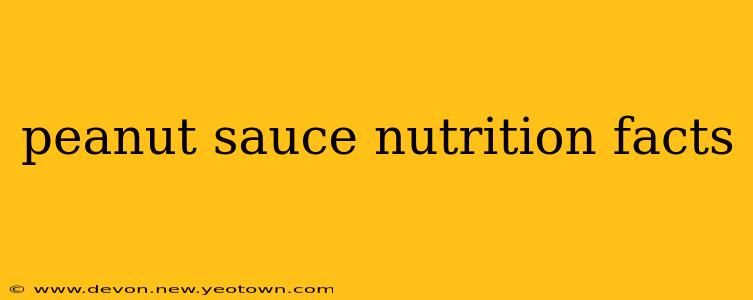Peanut sauce. The mere mention conjures up images of vibrant noodles, succulent satays, and the satisfying crunch of fresh vegetables dipped in its creamy embrace. But beyond its delightful taste, what's the nutritional story behind this culinary star? Let's unravel the nutritional facts of peanut sauce, exploring its benefits and potential drawbacks.
This isn't just about dry numbers; we'll explore the nuances, variations, and how you can enjoy this flavorful condiment responsibly. Think of this as your guide to making informed choices about this beloved ingredient.
What are the main ingredients in peanut sauce?
The foundation of any good peanut sauce is, unsurprisingly, peanuts! Roasted peanuts are usually the base, providing that rich, nutty flavor. Beyond that, the recipe can vary widely depending on the cuisine and personal preferences. Common additions include:
- Soy Sauce: Adds saltiness and umami.
- Rice Vinegar: Provides acidity and balance.
- Lime Juice: Offers a zesty tang and brightness.
- Garlic: Adds pungent flavor and potential health benefits.
- Ginger: Contributes warmth and a subtly spicy kick.
- Honey or Maple Syrup: Sweetens the sauce and adds viscosity.
- Coconut Milk: Creates a richer, creamier texture.
- Chili Garlic Sauce: Infuses heat and a savory depth.
- Sesame Oil: Adds a nutty aroma and flavor.
The specific combination and quantities of these ingredients drastically affect the final nutritional profile.
What are the calories in peanut sauce?
This is where things get tricky. The caloric content of peanut sauce is incredibly variable. A tablespoon of a simple peanut sauce (mostly peanuts, soy sauce, and a touch of sweetener) might contain around 70-100 calories. However, a richer sauce that incorporates coconut milk, oil, and sweeteners could easily reach 150 calories or more per tablespoon. Always check the specific nutritional information if you're making it from scratch or purchasing a pre-made variety.
Is peanut sauce high in fat?
Yes, peanut sauce is relatively high in fat, primarily unsaturated fats. Peanuts themselves are a good source of monounsaturated and polyunsaturated fats, which are considered healthier fats than saturated fats. However, the addition of coconut milk or other oils can significantly increase the overall fat content. The type of fat and the overall quantity are both important considerations.
Is peanut sauce high in protein?
Peanuts are a good source of protein, contributing significantly to the protein content of the sauce. The amount of protein will vary depending on the recipe, but generally, a serving of peanut sauce can offer a moderate amount of protein.
Is peanut sauce good for you?
Peanut sauce, in moderation, can be part of a healthy diet. Peanuts are packed with nutrients, including vitamin E, magnesium, and various antioxidants. However, it's important to be mindful of the sodium content (from soy sauce) and the sugar content (from added sweeteners). Choosing recipes that minimize added sugars and sodium, and focusing on the healthy fats from the peanuts, will maximize the potential health benefits.
Does peanut sauce contain gluten?
Most peanut sauces are naturally gluten-free, provided they avoid ingredients like soy sauce made with wheat. Always check the ingredient list, particularly if purchasing pre-made sauce, to ensure it's suitable for those with gluten sensitivities.
How many carbs are in peanut sauce?
The carbohydrate content of peanut sauce mainly comes from the peanuts themselves and any added sugars. The amount will vary depending on the specific recipe.
How much sodium is in peanut sauce?
Soy sauce is a significant source of sodium in many peanut sauce recipes. Those with high blood pressure or sodium sensitivity should be mindful of their consumption.
In conclusion, peanut sauce offers a delightful blend of flavors but its nutritional profile is highly dependent on the recipe. By making informed choices about ingredients and portion sizes, you can enjoy this culinary treat while remaining mindful of its nutritional impact. Remember to always check the nutrition label if using a pre-made sauce and adjust your intake accordingly to fit your dietary needs and goals.

